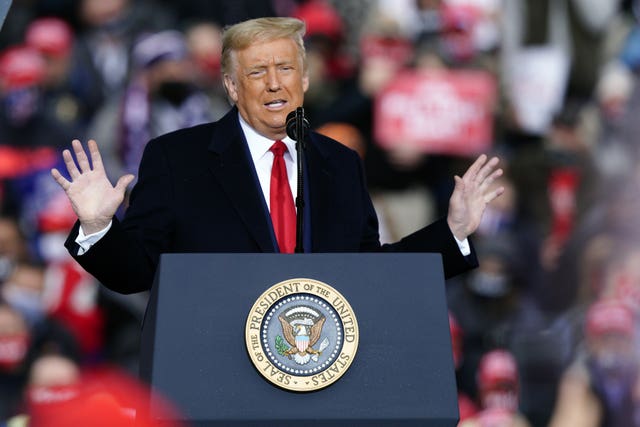Donald Trump’s historic second impeachment trial will open this week with a sense of urgency, from Democrats who want to hold the former president accountable for the violent US Capitol siege and Republicans who want it over as fast as possible.
The proceedings are scheduled to begin on Tuesday, just over a month since the deadly riot.
They are expected to diverge from the lengthy, complicated trial that resulted in Mr Trump’s acquittal a year ago on charges that he privately pressured Ukraine to dig up dirt on a Democratic rival, Joe Biden, now the president.
This time, Mr Trump’s January 6 rally cry to “fight like hell” and the storming of the Capitol played out for the world to see.
While Mr Trump could very well be acquitted again, the trial could be over in half the time.
Details of the proceedings are still being negotiated by the Senate leaders, with the duration of opening arguments, senators’ questions and deliberations all up for debate.

So far, it appears there will be few witnesses called, as the prosecutors and defence lawyers speak directly to senators who have been sworn to deliver “impartial justice” as jurors.
Most are also witnesses to the siege, having fled for safety that day as the rioters broke into the Capitol and temporarily halted the electoral count certifying Mr Biden’s victory.
Defence lawyers for Mr Trump declined a request for him to testify.
Holed up at his Mar-a-Lago club in Florida, the former president has been silenced on social media by Twitter without public comments since leaving the White House.
Instead, House managers prosecuting the case are expected to rely on the trove of videos from the siege, along with Mr Trump’s incendiary rhetoric refusing to concede the election, to make their case.
His new defence team has said it plans to counter with its own cache of videos of Democratic politicians making fiery speeches.

“We have the unusual circumstance where on the very first day of the trial, when those managers walk on the floor of the Senate, there will already be over 100 witnesses present,” said Democratic Representative Adam Schiff, who led Mr Trump’s first impeachment.
“Whether you need additional witnesses will be a strategic call.”
Mr Trump is the first president to be twice impeached, and the only one to face trial after leaving the White House.
The Democratic-led House of Representatives approved a sole charge, “incitement of insurrection”, acting swiftly one week after the riot, the most violent attack on Congress in more than 200 years.
Five people died, including a woman shot by police inside the building and a police officer who died of injuries the next day.
Democrats argue it is not only about winning conviction, but holding the former president accountable for his actions, even though he is out of office.
For Republicans, the trial will test their political loyalty to Mr Trump and his enduring grip on the party.
Initially repulsed by the graphic images of the siege, Republican senators including Senate Republican leader Mitch McConnell denounced the violence and pointed a finger of blame at Mr Trump.

But in recent weeks, Republican senators have rallied around Mr Trump, arguing his comments do not make him responsible for the violence.
They question the legitimacy of even conducting a trial of someone no longer in office.
On Sunday, Republican Senator Roger Wicker described Mr Trump’s impeachment trial as a “meaningless messaging partisan exercise”.
Republican Senator Rand Paul called the proceedings a farce with “zero chance of conviction” and described Mr Trump’s language and rally words as “figurative” speech.
Senators were sworn in as jurors late last month, shortly after Mr Biden was inaugurated, but the trial proceedings were delayed as Democrats focused on confirming the new president’s initial cabinet picks and Republicans sought to put as much distance as possible from the bloody riot.
At the time, Mr Paul forced a vote to set aside the trial as unconstitutional because Mr Trump is no longer in office, drawing 44 other Republicans to his argument.
A prominent conservative lawyer, Charles Cooper, rejects that view, writing in a Wall Street Journal opinion piece that the constitution permits the Senate to try an ex-official, a significant counterpoint to that of Republican senators who have looked towards acquittal by advancing constitutional claims.

Republican Senator Lindsey Graham, one of Mr Trump’s ardent defenders, said he believes Mr Trump’s actions were wrong and “he’s going to have a place in history for all of this”, but insisted it is not the Senate’s job to judge.
“It’s not a question of how the trial ends, it’s a question of when it ends,” Mr Graham said.
“Republicans are going to view this as an unconstitutional exercise, and the only question is, will they call witnesses, how long does the trial take? But the outcome is really not in doubt.”
The 45 votes in favour of Mr Paul’s measure suggested the near impossibility of reaching a conviction in a Senate where Democrats hold 50 seats but a two-thirds vote – or 67 senators – would be needed to convict Mr Trump.
Only five Republican senators joined with Democrats to reject Mr Paul’s motion: Mitt Romney, Ben Sasse, Susan Collins, Lisa Murkowski and Pat Toomey.




Comments: Our rules
We want our comments to be a lively and valuable part of our community - a place where readers can debate and engage with the most important local issues. The ability to comment on our stories is a privilege, not a right, however, and that privilege may be withdrawn if it is abused or misused.
Please report any comments that break our rules.
Read the rules here